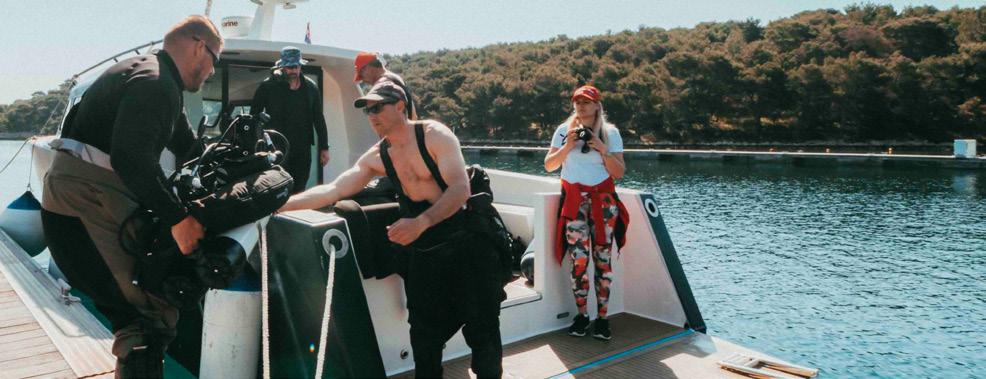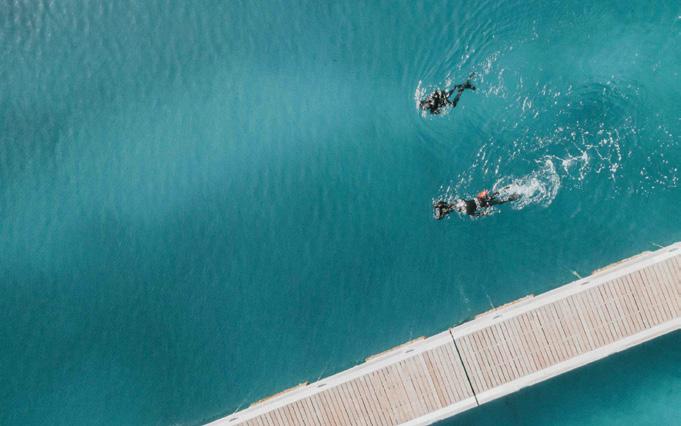
5 minute read
SUN, SAND AND SINGLE-USE PLASTIC
Melissa Novotny ’14 | NETHERLANDS
Melissa Novotny ’14 found her calling in the Dutch conservation startup Sea Going Green. The company aims to protect marine environments from the damaging effects of tourism by encouraging businesses all over the globe to #GoGreenForTheBigBlue.
Imagine diving into the Great Barrier Reef and seeing nothing but white, bleached coral. Collectively, coral reefs house around 25% of all marine fish species on Earth. Around half a billion people worldwide depend on coral reefs for food, livelihoods or coastal protection, yet UNESCO estimates that, by the end of the century, all 29 coral-containing World Heritage sites will cease to exist if current emissions trends continue. Our reefs are dying, but the tourism industry – a significant contributor to the reefs’ demise – is growing; the United Nations World Tourism Organization estimates that there will be around 1.8 billion international tourists a year by 2030. Reef bleaching isn’t the only major marine conservation issue; plastic pollution from tourism rose even higher in 2018 – over 8 million metric tons of plastic end up in the oceans every year, and about 40% of it is single-use. Tourism can cause harm, but it doesn’t have to: we can alleviate the negative impacts of the industry on marine environments, especially in coastal communities and underwater ecosystems. That is the mission of my current startup, Sea Going Green.

CROATIA OCEAN CLEANUP
Photos: Sam McAllister
I found my way to this startup the long way around. After graduating from AUP with a BA in History and International and Comparative Politics in 2015, I completed a master’s in political science at the University of Amsterdam. After my studies, I worked on assignments at the International Centre for Counter Terrorism (ICCT – The Hague) and later at the International Labour Organization in Vietnam. While in Asia, I noticed a paradox between the high plastic pollution and the efforts of many young locals to refuse single-use plastic bags and to participate in cleanups. Tourism was a key reason for this disconnect; to help overcome the paradox, someone needed to convince tourism companies to take steps toward sustainability.
I returned to Europe where I started volunteering full-time for a Netherlands-based NGO focusing on the sociocultural integration of refugees; being at such a small startup was eye-opening as it showed me an alternative to sitting behind a desk, working on red-tape-covered projects under a hierarchy of superiors. A few months later, and quite out of the blue, I met the founder of a brand-new startup called Sea Going Green, which was working on marine conservation through ethical tourism. I felt energized by the mission and ready to dive into something more innovative. I pitched myself, explaining what I could offer the company, and then took on the role of Business and Partnership Development Manager.
I joined Sea Going Green at a very exciting time, just weeks after our first client was signed: The Yacht Week, the biggest yachting tourism company in Europe. When we work with a new client, we start by creating a tailor-made Green Transition Strategy. This is a three-stage process that includes an environmental impact assessment, a customized responsible tourism policy and a best-practices report – as well as green branding suggestions to help companies communicate their transition to staff and customers. As part of The Yacht Week’s transition strategy, we took part in a collaborative dive in Croatia with ex-military divers during which we collected one metric ton of waste. The video of the cleanup went viral with over 100,000 views. We also calculated the company’s carbon footprint and established a baseline on their usage of fuel, water and single-use plastic. After clients complete a transition strategy, we encourage them to lead the way as ocean champions in the tourism industry; with this new data and our strategies in mind, The Yacht Week held a “Revive Week” this year in Greece, which included beach cleanups, reef dives and “ghost-net fishing” – the removal of abandoned fishing nets from marine environments.

Photos: Sam McAllister
When crunching the numbers for The Yacht Week’s environmental impact assessment, I encountered several methods I’d used before in AUP’s Energy and the Environment course. Having a liberal-arts background has equipped me with a competitive edge and has opened doors to jobs outside the usual fields available to a politics graduate. When I started at Sea Going Green, a lot of the scientific and business aspects of my work were new to me; I’d spent much of my time up to that point drawing up project proposals and conducting research. I felt inspired by the fight against unsustainable tourism, pollution and climate change to take on these extra challenges; taking the risk to try something new in a demanding scientific field has been the most rewarding project I’ve ever worked on.
That risk has certainly paid off. One of the most exciting achievements of my career has been having a blog piece that I co-wrote – along with Sea Going Green’s founder, Ally Dragozet, and Jemi Lacle of the World Bank – published by the World Economic Forum (WEF) in both English and Spanish. It was titled “Tourism Is Damaging the Ocean. Here’s What We Can Do to Protect It.” A video presenting the article reached over 4.5 million views! Seeing people react to our content in this way was inspiring, and it validated our conviction that tourists prefer destinations that operate sustainably.
Since joining the company, I have enjoyed the opportunity to improve my impact writing: I had been so used to dry, formal political writing that I had to go back and rework my style to reflect my creative personality and bring my writing to life with my own voice. At Sea Going Green, I conduct interviews and produce blog posts, presentations and our Summer Guide for Sustainable Travel – a downloadable guide with tips to help tourists enjoy a more sustainable vacation. Weekly blogs serve as a key part of our awareness-building platform; they focus on the biggest issues facing the marine and tourism industries today. Topics range from advice to yacht crews on how to act sustainably to best-practice ideas for river cruise operators. Being an editor and content advisor is one of the most fulfilling aspects of my work.
It has absolutely been worth the struggle to find work that intersects with my own interests in this way. Working on a project with such an important mission makes this all the more fulfilling. By spreading the message of marine conservation and sustainable tourism, we are opening the door for other businesses in the tourism and hospitality industries to take steps toward sustainability – and making it that much more likely that the coral reefs and coastlines we all enjoy will still be there for generations to come.

Photos: Sam McAllister










